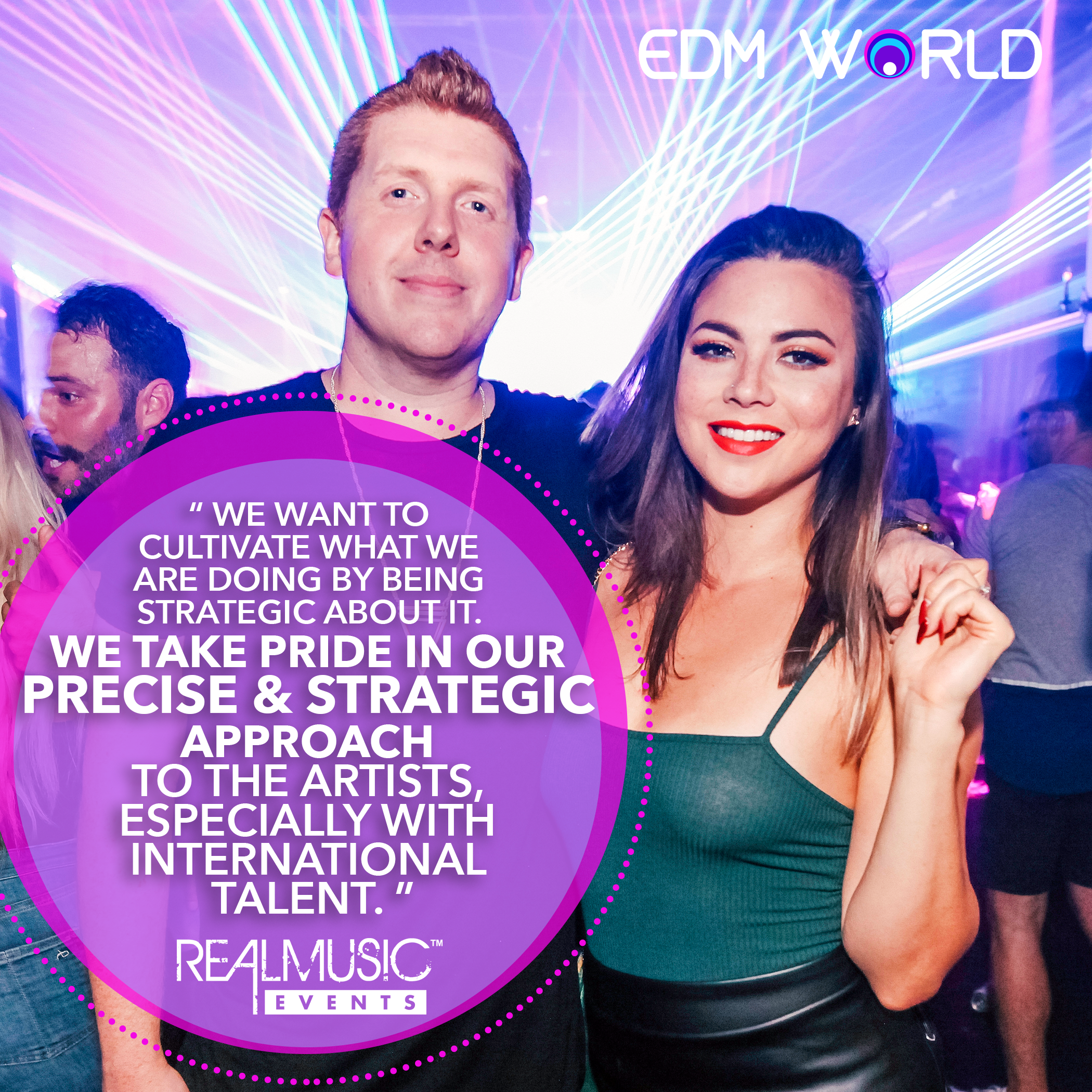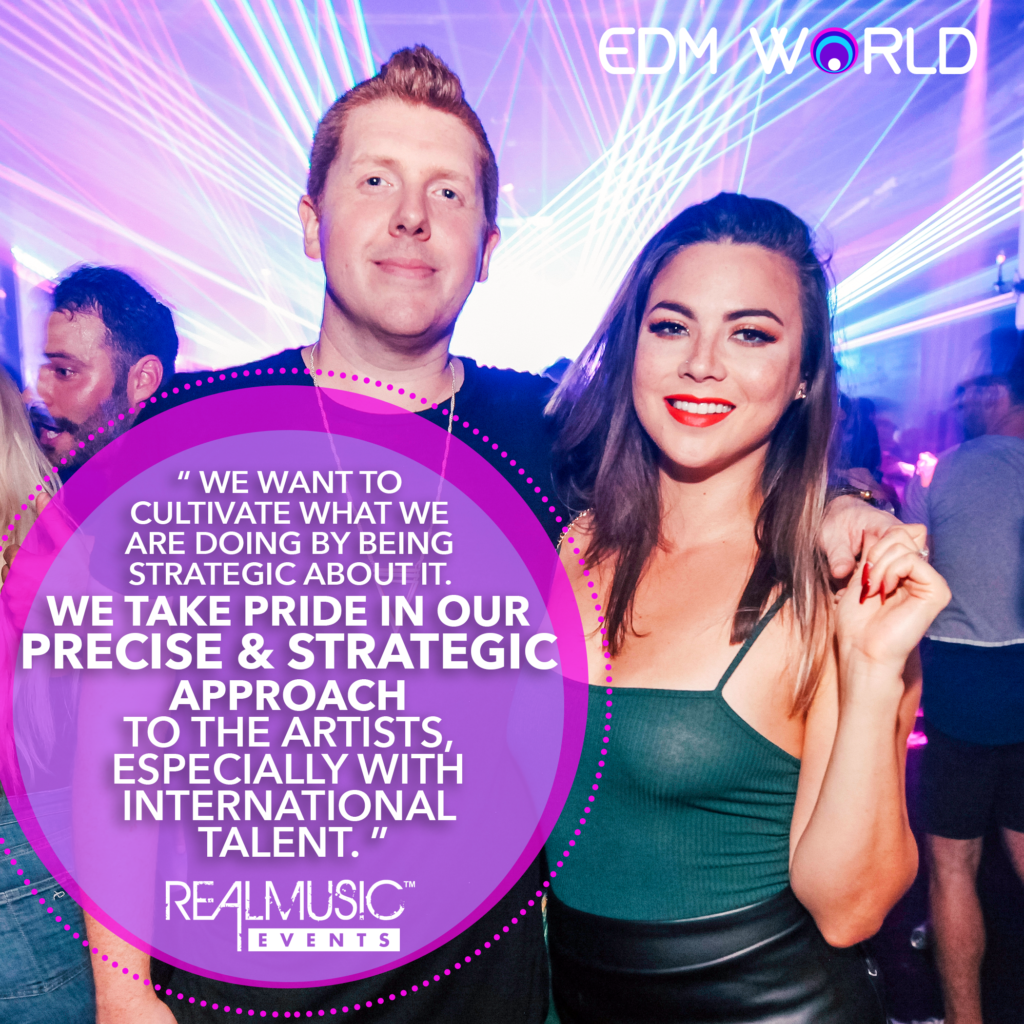
23 Feb The Minds Of RealMusic Events
In This Article (Click on a section to quickly go to it)
The Minds Of RealMusic Events
By Maximilian Polishuk
*This interview is older and was in our Issue 66 magazine.
Austin, Texas is the live music capital of the world. It has a unique power duo on its hands. The married duo of Andrew Parsons and Kelly Gray. They are the creative minds behind RealMusic Events who are credited for continually growing and evolving the electronic dance music scene in the city.
Not surprisingly, they both met casually while working in the Austin music scene. The friendship became something more than they could imagine as both had individual creative outlets that were being showcased at the time. What started out as simply putting on shows became something much bigger for both of them. Andrew and Kelly are considered to be the epitome of what it takes to make it in this industry.
You should realize that RealMusic is more than just a brand. It’s a lifestyle of different parts of the music scene. Their constant go-for-it attitude and making sure everything is aligned are important for their business culture.
The vibe they go for is unique and boutique. They are constantly bringing in major talent. For years to come, their high-value productions are what they will be known for no doubt.
I had a chance to catch up with them after Seismic 3.3 to discuss their history, RealMusic Events, and what is stored for them in their next chapter of life with the Concourse Project.
Who or what about the electronic dance music scene made you fall in love with it? Why?
Andrew: It started with my brother as he was the one that got me into dance music. I was pretty young when he came back from college with kandy and stuff. I was saying, “What was that?”
I went to my first rave when I was 13 so that is where it began for me essentially. From there, I started DJing when I was 14 or 15 years old and started to play out gigs in clubs and festivals. I played Electric Daisy Carnival in 2001 and 2002.
I went from there and started a record label while I was in High School called RealMusic Recordings, in which I started throwing shows in 2006. I met Kelly, and we started throwing events in 2009 under RealMusic Events.
Kelly: I grew up in San Antonio and went to school at the University of Texas. That is where I was introduced to electronic music. I did not know there was an electronic dance music scene here because I was not exposed to it from where I was from.
Once I was a freshman in my first semester Halloween Night at an event in the forest called Enchanted Forest. It was an electronic dance music event. People were in crazy costumes. It was a sensory overload for me. It was crazy as I never experienced anything like this. I was really into the music there and it was my first experience. I just loved it.
When I got back, I started downloading as much electronic music as I could to start learning it and finding more sounds that I liked. I needed more. It never stopped after that. I digested it as much as possible.
This leads me to immerse myself in the local scene as I would go to every show. At the time, there was one show where everyone would be there. I would go to all of those. I ended up starting my own dance group and costume design while performing in 2007.
In 2008, Andrew and I started working really hard at promoting events. Andrew was DJing and by 2009 we started our own stuff because we were motivated to bring in new things. Things that haven’t been here.
It aligned with our passion. We have been adamant that people should be doing it for passion and not for profit. That is what we’ve been doing and we’ve constantly been growing.
How did parts of your life from childhood spark your journey to working in the music industry?
Kelly: I don’t think growing up we thought we would want to work in the music industry. I grew up playing the violin until I was a senior in High School. I gravitated towards theatre when I was younger.
I’ve always been drawn to the creative outlet and I finally found my creative outlet when I got into the scene. It all came together. It felt like magic. I found my self-expression in terms of performance of dancing and costume design. It always sparked a desire to do more.
We’re so immersed in it as we experience everything as fans that you know how things should operate so you’re going to help facilitate that for others. Therefore it keeps growing. I was always passionate about music and entertainment. I wasn’t sure what my destiny would be.
Andrew: Music has always been a big part of my life. It always has made sense to me. When I was young, I was a drummer and was in a band, but I also was a troublemaker.
Drumming was a big part but finding new artists was always a big deal for me. That is what played into me starting the label which led me to learn about bookings. I have always been on the hunt for new acts and finding them first. This is something I always liked and it plays a big part in what I like about the music industry.
Electronic dance music in Austin was below the radar for a long time as other genres of music took over the music venues. How were you able to navigate to create electronic music events when venues took on other acts?
Kelly: I think it’s about growth and keeping your finger on the pulse. We were both early on in our time here in Austin. Though it is not as prominent as it is now, there still was that one-nighter, and everyone would go to that one event regardless of the genre.
There still was a scene but social media really helped with the networking of it here. There were a variety of things happening from the warehouses to the forest and to the clubs happening once a week. We wanted to bring in more so it started there.
We decided to bring in talent that we wanted to hear as we were immersed in it. We started growing and the scene grew with us. Once you solidify your reputation, if you ever needed to use a different venue, you could tap into it. People want you to throw events there. It was better to align ourselves with venues that would accommodate dance music.
You have produced and executed several big parties. What key lessons did you learn to help you successfully launch a Seismic Dance Event?
Kelly: First, there was the pre-part. Make sure you do not rush into something until you’re ready to do it. We started Seismic in 2018 as we had already been doing events for nine years at that point.
We were not going to do it unless we knew we could do it properly. For example, we did not say, “Oh it’s cool to do a festival so I’m going to do it.” We did it when we were ready to do it at the scale quality that we wanted to.
Andrew: I will say that we weren’t scared. The reason why we took so long before we did it was that we questioned ourselves if we were ready for this, but Kelly was wanting to push it forward so we did it.
Kelly: It took a while. We had to think of a brand name that was not already taken and could expand on the creative vision. With the name Seismic Dance Event, there is a Volcano and Tsunami stage. We used waveform and music waves to symbolize seismic activity. So we spent time developing the brand. We wanted to make sure we developed a brand that made sense.
Like, what is the sound you will be doing? What are the logistics to make it happen? You do not want to fudge it as you have to think of every single facet. Persistence is the big lesson when throwing a festival because you’re going to be challenged with millions of curveballs that do not happen according to your plan and it’s imperative in how you overcome those to find solutions.
For Seismic Year 1.0, it was flooding that week. We said we’re not canceling this. Within four days we changed venues and redid all of the logistics to move it to the Travis County Expo Center. That was a crazy feat because it’s not normal to do something like that; especially in your first year of doing a festival. We made it happen. We survived the impact of it and kept going.
You both started RealMusic Events as a part-time job. When did you decide to do this full-time?
Kelly: We staggered it. Andrew did it first. For me, my advertising job was still our income for us to take the risk. I did not leave my job until 2019. That was because everything started to get bigger. I was able to balance everything going on with a full-time job while also doing our events as club shows do not take a ton of work to make it happen.
This is especially true when things are running like clockwork. Things started getting more intense with our festival as it was growing. The scale of everything was growing too much for me to split my time and energy. If I wanted to do this, I needed to take the plunge. I saved up enough to have a backup for a while and that allowed me some time to focus and develop these brands.
What has been your biggest struggle to get to where you are today? How did you overcome it?
Kelly: I think the biggest struggle I have been facing would be financial losses to fulfill the dream.
Andrew: That is definitely a big part of it. I also think growing our team has been pretty hard because we want to find the right people in this industry that fit us and our culture.
Kelly: Also, trying to find someone that can be a badass. We always joke that we are a mom-and-pop shop. We have a big impact but yet a small team. It took me ten years to go full time, so being able to add other team members has been a challenge as we have been doing part-time and contract work for the team.
We just started giving out full-time offers to our team, which is nice and exciting as it is so necessary because of everything we have been doing. It is something that can limit you if you don’t grow when you need to grow. We made sure that we grew with the right people. We didn’t want to grow to just grow.
We are very specific about how the mindset is, people doing it for the right reasons, people having passion, treating the team well, and people know their shit. It’s not just a party and enjoying the event. You need to find someone in this industry that is passionate and appreciates this but can also work hard.
What three personality traits do you look for when putting together your support team around you?
Passionate, down-to-earth/real (Plug RealMusic Events), and sharp. You’ve got to know what you’re doing. If you don’t have attention to detail, it won’t work.
What’s your booking strategy as it relates to tapping into the trends of the market?
Andrew: RealMusic Event vs. Seismic is relatively similar in a way but different when it comes to my strategy for booking. I always say that I am a DJ first and that plays super hard into what we book. I always say we book things that we like that are our number one but we are not booking because we have to.
Everything I like as a DJ plays into bookings. I try to pay attention to new artists and stuff like that. I really had to cut back on booking artists too soon as we’ve been ahead of the curve, but it’s been a learning curve. It just has to wait a while because people are not as quick to listen to these artists as we are.
I think we do a good job booking obscure names that do not tour the US often. Some of those things people might consider being more popular in the UK, but it depends on how you look at it.
Looking at the Seismic 4.0 lineup is going to be insane. I want to book more obscure things as it’s about getting people to know even more new music. I have to make sure to book name talent as well to balance it however.
Kelly: You will catch people with the big names who are arguably hot in the industry. You also want to build that trust in discovering new artists so that you have that balance. That is what we like doing.
They’re artists that we would book, but we have to wait as sometimes they do not travel often or the stars do not align. We know who we are going for and we usually go for it. Versus the other way, which is waiting for booking agents to send out a mass email that they are now booking this tour, etc. That has never been our thing.
We want to cultivate what we are doing by being strategic about it. We take pride in our precise and strategic approach to the artists, especially with international talent.
How do you compete with other festival promoters for top-notch talent?
Kelly: It is about owning what you bring to the table. We’re not competing necessarily with any of the organizers as they skew to a certain crowd. They might have more mainstream stuff at their events. We skew more towards a seasoned veteran who has been in the scene for a longer time and wants to do it as a boutique festival.
We had great experiences going to boutique festivals where there aren’t too many people and it’s not overcrowded. That is our ideal when it comes to Seismic. We wanted to bring in top-notch talent in the house and techno scene but at the same time keep it small.
What challenges did you learn from Seismic Dance Event 3.3?
Kelly: We had all kinds of challenges. We had COVID-19 with its ever-changing landscape. We had to postpone the event two times and format it to fit COVID-19 guidelines.
The weather was also just like year one. We were facing crazy rain in the forecast. We had professional weather reports coming in daily including the 7-day outlook, which showed it was not looking good. We started all of these mitigation plans to put in a new road for parking and we had a bunch of mulch.
One thing about Texas weather is that it is constantly changing. Friday was looking better but we woke up Saturday to a storm. We went on-site to investigate the damage with our public safety organization. We had to deal with that and had to cancel the day.
We, of course, resumed programming the next day. Also, we had the challenge of international artists due to the pandemic. They had to get their approval forms to come here but they were subject to being denied even if they had their visas.
Some got denied very late in the game and we had to implement our backup plans for different artists so we were changing those off the cuff before the event. It really was every possible curveball you could imagine.
What do you want attendees to remember, feel, or take away with them after attending the Seismic Dance Event?
Kelly: I think we take pride in all aspects of the event. Especially as we grow, we want people to be wowed. One, in particular, I definitely would say is having great music sets. We want them to be wowed that they got to see so many artists that are still being discovered while also having the best time of their life surrounded by such an amazing crowd filled with energy. That was something that was always a part of our brand. We always wanted to make sure the vibe was always good and everyone since year one was telling us how good the vibe was.
This year we felt the changes as attendees were flying from out of state. We saw the changes in the dynamics with social media especially dealing with the disappointment of artist cancellation. We didn’t want to ruin that special vibe and energy but once you’re on-site, you see everyone is so happy. We are so thankful and grateful because we did not know when we would be able to have this experience again. Being able to immerse yourself in that energy and making sure people are having the best time of their lives is key.
Andrew: I definitely want people to enjoy the sets first and foremost as they work really hard on them. I actually heard from quite a few people at 3.3 that these artists would play a little differently by pulling out a different set that they normally wouldn’t do, but people would like.
What is your vision for the future of Seismic Dance Event? Do you plan to keep Seismic intimate or want to go bigger?
Andrew: The plan was always to grow Seismic, but we always wanted to keep it with a relatively boutique feel. That is very important to our brand and also the vibe. We wanted to make sure we had our venue.
We do plan on growing as the last edition we were not able to do so because of the pandemic. We had to cap it at a certain amount but we do want to do more this year. We want to keep it to three days, bring in more people, bigger production, more acts, and stages.
Kelly: We were talking about this earlier. Where do we see ourselves growing? It is a delicate balance as we will not set a number and see how each year goes. We do want to keep that authentic intimate feeling.
There are ways to still grow with people and keep that momentum going with multiple stages on how we disperse. Right now, we want to stay under 10k per day as it feels more intimate. You lose essence when you get too big.
On the good side of growing, you can grow your production, the art, and everything in between. We want to continue to build, but your hands are a little tied when you get too intimate. Getting to grow to a state where we preserve that while adding more amenities is going to be a nice thing.
Andrew: Plus, tickets have always been priced a little bit higher because we have been so small. I think our lineups are extremely strong compared to other festivals. Some of these festivals are doing crazy numbers and the lineup is not as strong.
I think it’s cool that our vibe is to have a special lineup and have it very intimate. I want to make sure we keep that but also grow it organically. I want to make sure we’re doing it right. We’re not in a rush to grow as we want to make sure everyone is comfortable with the vibe intact.
What have been some of your favorite moments from years past at Seismic Dance Event?
Kelly: My ah-ha moment was in 2019 with Cirez D and his LED light production. We’re usually so busy running around that we do not get to enjoy what we want to enjoy, but I was not missing that as it was too mind-blowing. I was out there by myself taking videos and soaking it all in. That set was a once-in-a-lifetime moment for me.
This year was the ZHU/Blacklizt set. We have this thing at Seismic where people play by their Alias. Deadmaus doing his TestPilot set allows us to get something more unique and interesting out of them that they don’t normally do as an artist so they appreciate it. We get to hear something more unique. I finally got to go out there again, look at the production, and enjoy it. I’m glad I was able to end the weekend on that note.
Andrew: For me, we’re running around a lot but at least at ZHU I had a moment where I got to get on stage which I never do. If you know me at all, I don’t like hanging out on stage. So on stage, I took my earpiece out to enjoy some nice music.
Seismic Dance Event 3.3 took place outside of a venue that will host your new club called The Concourse Project. Can you give me details about this exciting venture?
Kelly: 18,000 ft square warehouse that is new construction in which we are building everything out to our dream specs. It’ll have great productions. The key thing about this venue is that it will have this modular system in which you can have a different floor plan depending on the show.
For the patron, they do not know what they will be getting themselves into as it will be a different experience. It’s almost like a different destination every time. We wanted to make sure it was not just another club.
How did you come up with the name The Concourse Project?
Kelly: Well, we went through a lot of different names. We have a partner named David for this project. He helped design the vision for us all. We are very aligned with it. We wanted to make sure it wasn’t a nightclub theme or name.
The venue is right next to the airport so we wanted to have the exact same idea of going to the concourse to go to your different destinations. The project part signifies that it is ever-evolving and the kind of project we are always growing. It is not going to get stagnant.
What is the plan for the rest of this year and next year?
Andrew: Going into next year as we’re coming out the pandemic right now is to rebooking shows that were canceled. Seismic 4.0 is coming and we may have a really cool alias playing this year. Starting next year we plan to differentiate with the layouts of the Concourse Project.
Kelly: For our opening weekend at The Concourse Project we have Diplo coming and we just announced Carl Cox and Boris Brejcha. We have major things coming through with a variety.





No Comments